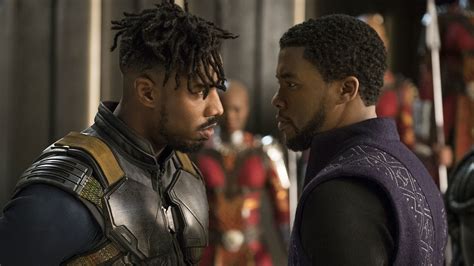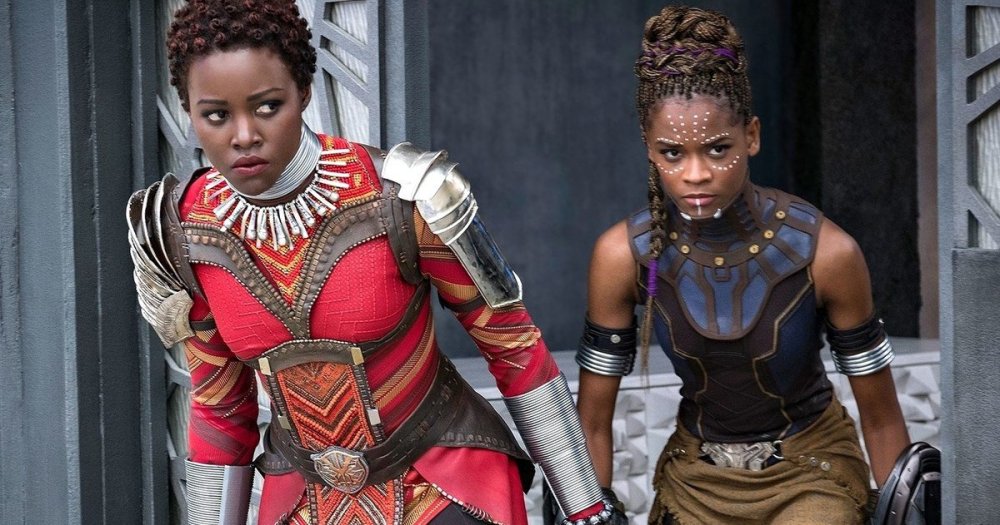5 out of 5 stars.
Although several superhero films over the past couple years have done different things to make audiences rethink the genre, it’s easy to be inundated with the sameness of the Hollywood blockbuster. This is especially true of the Marvel Cinematic Universe, which found a formula that seems to please audiences and has stuck to some variation of that for almost all of their films, despite many of the films featuring heroes who have different abilities and backstories. That’s why when a film does something different, people take notice. The 18th film in the MCU, “Black Panther,” manages to fit into this established universe while also looking and feeling entirely different—and telling a very personal story that has real meaning.
Directed by Ryan Coogler (who also wrote the screenplay with Joe Robert Cole), “Black Panther” jumps right into T’Challa’s (Chadwick Boseman) story after the events of “Captain America: Civil War.” That film first introduced audiences to T’Challa, who took on the mantle of Black Panther after his father, the King of Wakanda, was killed, and also introduces a couple supporting characters who play larger roles in this film. If you haven’t seen “Civil War” prior to this film, I recommend doing so just to better grasp certain references, but if you don’t, that’s actually okay, because this is one of the few Marvel films that stands very nicely on its own.
But back to the story of this film. T’Challa comes home to Wakanda and his family—the Queen Ramonda (Angela Bassett) and younger sister Shuri (Letitia Wright), the smartest person in the world and the one in charge of Wakanda’s technology—to be formally crowned King. Wakanda is an African nation regarded by most of the world as a Third World country, but that’s all a front. As described in a magical animated sequence at the start of the film, the first Black Panther was a warrior who gained superhuman abilities by ingesting the heart-shaped herb and used his powers to unite the African tribes who were at war over the powerful metal vibranium. They formed Wakanda and used vibranium as the basis for all their weapons and technology, and chose to isolate themselves from the world rather than share their knowledge. It’s this choice that forms the basis of the conflict in “Black Panther.” When the new King obtains intel that arms dealer Ulysses Klaue (Andy Serkis) has surfaced in South Korea with a bit of stolen vibranium, T’Challa sets out to bring him to justice, but unveils a much larger threat instead: a young man who calls himself “Killmonger,” (Michael B. Jordan) who has a connection to T’Challa’s family and past and wants to use Wakanda’s weapons to overthrow those who have oppressed their people—black people, minorities—all over the world.

This is only the third feature film Coogler has directed, but his previous two films—“Fruitvale Station” and “Creed”—are both knock-outs, making him the perfect person to helm “Black Panther.” I mentioned before that this is a very personal story. T’Challa begins the movie as the Black Panther; one of the film’s earliest scenes is the ceremony in which he is crowned King of Wakanda. This is not an underdog story, as he begins the film at the top, but it is about him struggling to be that person at the top, someone who has to lead and protect his country but has doubts about whether what they’re doing is right, and who also must come to terms with revelations about his family that don’t fit in with his personal moral code. Boseman, who stole “Civil War” out from under most of the MCU’s biggest heroes, gets to fully dive into this character here. He carries himself proudly, but isn’t afraid to show T’Challa faltering. This is also a character filled with love—for his people, his home, and his family—and it’s hard to imagine anyone other than Boseman being able to balance that sensitivity as T’Challa with the fierceness of the Black Panther in combat.
This is a story of rising, falling, and redemption, but for its villain as well as its hero. Killmonger (whose real name is Erik Stevens, a boy who grew up in a rough neighborhood in Oakland, California) is the MCU’s most fully realized villain by leaps and bounds. This is no alien or god from another realm come to set fire to the Earth, or a power-hungry industrialist/inventor gone rogue. This is a real, relatable person who makes decisions that are bad, but are also understandable. There’s an added layer to the character that I won’t discuss here because spoilers, but he has grown up around drugs, violence, crime, and injustice, so to see the Wakandan’s thriving, shut off from the rest of the world, is infuriating knowing that they could change the world. Thanks to a powerful performance from Jordan (who collaborated with Coogler on his previous two features), Killmonger is both a scary villain—he poses a real threat to T’Challa—and a sympathetic human, and his final emotional encounter with T’Challa is a gut-punching, tear-inducing scene the likes of which haven’t been seen in a Marvel movie before.

One of the most notable aspects of “Black Panther” is its cast, which is comprised almost entirely of black actors, with the exception of Serkis’ Klaue and Martin Freeman, who plays CIA Agent Ross and provides an outsider’s view of Wakanda. It is outside the realm of Hollywood normalcy to see a mainstream, blockbuster film that is not only helmed by minorities, but that also makes their diversity an integral part of the story, and it is one of the many reasons why this film is so refreshing. This includes the many fierce women who make up much of the main cast. Lupita Nyong’o, an Oscar winner for her first film who has been relegated to unsubstantial supporting roles for much of her career, gets to play a character worthy of her talents. Nakia, besides being T’Challa’s ex-girlfriend, is a Wakanda spy with a desire to help those who can’t help themselves; the first scene we see her in has her freeing refugee women in Nigeria. Wright’s Shuri and Danai Gurira’s Okoye are two of the film’s biggest scene stealers. Shuri is a wisecracking teenager who provides a lot of comic relief, but is also extraordinarily intelligent, and the bond she has with her brother is obviously very strong without either of them needing to say so. Okoye, meanwhile, is the general in charge of the Dora Milaje, the group of all-female warriors who serve as the King’s bodyguards (another very cool thing about this movie). She is a very stoic figure, is intensely loyal to her country, and has many of the film’s best action scenes, but also has a sense of humor that it is fun to catch glimpses of. The supporting cast is rounded out by Sterling K. Brown, John Kani, Winston Duke, current Best Actor Oscar nominee Daniel Kaluuya as T’Challa’s friend and head of his tribe’s security, and Forest Whitaker as Zuri, a spiritual figure who helps guide T’Challa on his path to becoming a leader.
“Black Panther” also has a decidedly different look compared to previous Marvel films because, besides a couple scenes in an Oakland neighborhood and a quick adventure in South Korea, the vast majority of the film is set in Wakanda. The scenery is gorgeous, Wakanda itself exhibiting an intoxicating mixture of traditional African open-air markets and a sprawling city powered by the most advanced technology. The music adds to the flavor, with a score featuring African musicians composed by Ludwig Goransson and a soundtrack produced by Kendrick Lamar. From the costumes to the rituals and traditions held by the characters, African culture influences this film, and is also celebrated by it.
From cool tech, humor, thrilling chase scenes, and fight sequences that range from hand-to-hand combat to all-out war, “Black Panther” has everything we come to a superhero movie expecting to see. But it is so much more. The two main characters go through journeys more personal than any other hero movie we’ve seen in a while, and certainly more so than anything from the MCU, but the film also manages to focus on the bigger picture. No, I don’t mean the “Infinity War” bigger picture, but the bigger picture of our society, how racial and ethnic differences increasingly result in people shutting each other out as opposed to coming together. It is a vital message, one that T’Challa carries with the sort of compassion we don’t seen in big-screen superheroes enough. Marvel can cram however many heroes they want to in “Infinity War;” in terms of storytelling, it doesn’t get much better than “Black Panther.”
Runtime: 134 minutes. Rated PG-13.
Great review to help me better feel and understand everything in the film that is going on mirroring today’s real challenges. I can’t wait to see it!
JC
LikeLiked by 1 person